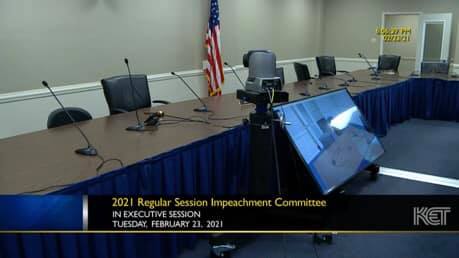
Some final thoughts on the Kentucky Impeachment Committee's claim that its proceedings represented a major change," and would not be conducted "behind closed doors."
We are not convinced.
The committee's "open" proceedings culminated in its February 23 announcement that it would recommend to the Committee on Committees that no further action be taken on the Beshear and Cameron petitions. Based on earlier testimony — this much we know because the testimony was offered in open session — the committee dismissed the Goforth petition because a legislator cannot be impeached under existing law.
A summary of its recommendations in the form of a report is available — but not the verbal give and take that yielded that report.
Each time the Impeachment Committee chair called for a closed session, we questioned how his actions comported with his stated commitment to openness.
Each time the chair solicited a motion to "make public" the committee's records, we winced.
All documentation that is "prepared, owned, used, in the possession of or retained by a public agency" is a "public record." The committee is a public agency. The records were used, possessed, retained, and in some cases prepared, by the Committee. They are public records belonging to the public. The committee's vote did not make them so.
https://apps.legislature.ky.gov/law/statutes/statute.aspx?id=45231
In late January, The Courier Journal reported on "Petition records from the past decade obtained by The Courier Journal from the LRC via an open records request. . . ."
https://www.courier-journal.com/story/news/politics/ky-general-assembly…
The Legislative Research Commission jealously guards its "public records," yet even the LRC recognized the public status of impeachment records from the past in honoring the Courier's open records request.
Although the committee convened each of its eight public meetings commencing on January 11 in open session and concluding on February 23 in a 4.5 hour executive session, the public's business was conducted almost entirely in closed session — at last estimate some 16 hours worth.
Setting aside the fact that proper notice of its meetings was never given, there was no appreciable difference between past "closed" impeachment proceedings and these impeachment proceedings.
The only public "discussion" consisted of the expert testimony — largely identical — of two University of Kentucky law professors, two softball questions from committee members directed at the professors — really summaries of the professors' testimony — and Rep. Massey's public statements relating to his refusal to recuse himself.
"The right of the public to be informed transcends any loss of efficiency." The public's right to be informed includes not only the right to know what decisions are made but how they are made.
https://casetext.com/case/lexington-herald-leader-v-univ-of-ky
This committee's actions were largely inconsistent with the purpose and intent of the open meetings law — recognizing that the formation of public policy is public business — and the law's fundamental mandate that all meetings of a quorum of the members of a public agency at which public business is discussed or at which action is taken shall be open to the public at all times.
https://apps.legislature.ky.gov/law/statutes/statute.aspx?id=23042
https://apps.legislature.ky.gov/law/statutes/statute.aspx?id=48229
What happened in closed session is likely to remain in closed session as the committee members have expressed reluctance to reveal the substance of their closed session discussions.
This rankles primarily because the chairman professed a commitment to an open process but conducted the process — almost entirely — behind closed doors.
Although the Impeachment Committee had no blueprint for openness, its "public" proceedings seem a monumental waste.


